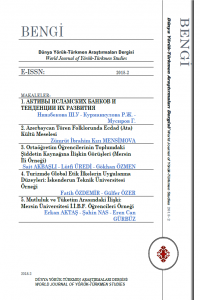Öz
İktisat biliminde tüketim ve mutluluk arasındaki ilişki önemli bir çalışma alanı haline gelmiştir. Bu sebeple çalışmanın amacı Mersin Üniversitesi İktisadi ve İdari Bilimler Fakültesi öğrencilerine yönelik tüketim kalıpları ve mutluluk arasındaki ilişkinin incelenmesidir. Çalışmada Oxford Mutluluk Ölçeği (OMÖ) anketi kullanılarak 286 öğrenciyle görüşme yapılmıştır. Anketlerden elde edilen veriler sıralı probit (ordered probit) model yöntemiyle analiz edilmiştir. Analizin sonucunda elde edilen bulgulara göre öğrencilerin harcamaları ve mutluluk arasında bir ilişki olmadığı tahmin edilmiştir.
Anahtar Kelimeler
Davranışsal İktisat Mutluluk Tüketim Sıralı Probit Mersin Üniversitesi
Kaynakça
- Ball, R. & Chernova, K. (2008). Absolute Income, Relative Income, and Happiness.Social Indicators Research, 88(3). 497-529.
- Bauman, Z. (1999). Çalışma, Tüketicilik ve Yeni Yoksullar. Sarmal Yayınevi: İstanbul.
- Becchett, L. & Rossetti, F. (2009). When money does not buy happiness: The case of “frustrated achievers”. The Journal of Socio-Economics, 38.159–167.
- Bocutoğlu, E. (2014). Ana Akım Konjonktür Teorileri ve 2007 Küresel Finansal Krizi. International Review of Economics and Management, 2(2), 1-39.
- Burns, J. H. (2005). Happiness and utility: Jeremy Bentham's equation. Utilitas, 17(1), 46-61.
- Busch, M. (2008). Adam Smith and Consumerism’s Role in Happiness: Modern Society Re-examined. Major Themes in Economics, 10(6). 65-77.
- Caporale, G. M., vd. (2009). Income and happiness across Europe: Do reference values matter? Journal of Economic Psychology, 30. 42–51.
- Caporale, G. M., vd. (2009). Income and happiness across Europe: Do reference values matter? Journal of Economic Psychology, 30. 42–51.
- Çirkin, Z. & Göksel, T. (2016). Mutluluk ve Gelir. Ankara Üniversitesi SBF Dergisi, 71(2). 375-400.
- DeLeire, T. & Kali, A. (2010). Does consumption buy happiness? Evidence from the United States. Int Rev Econ, 57. 163–176.
- DeLeire, T., & Kalil, A. (2010). Does consumption buy happiness? Evidence from the United States. International Review of Economics, 57(2), 163-176.
- Demir, R. ve Murat, M. (2017). Öğretmen Adaylarının Mutluluk, İyimserlik, Yaşam Anlamı ve Yaşam Doyumlarının İncelenmesi. Uluslararası Toplum Araştırmaları Dergisi, 13(7). 349-378.
- Doğan, T. & Çötok, N.A.(2011). Oxford Mutluluk Ölçeği Kısa Formunun Türkçe Uyarlaması: Geçerlik Ve Güvenirlik Çalışması. Türk Psikolojik Danışma Ve Rehberlik Dergisi, 4 (36).165-172.
- Doğan, T. ve Çötok, A. (2011). Oxford Mutluluk Ölçeği Kısa Formunun Türkçe Uyarlaması: Geçerlik ve Güvenirlik Çalışması. Türk Psikolojik Danışma ve Rehberlik Dergisi, 4(36). 165-172.
- Dumludağ, Ö. G. (2011). Mutluluk Ve İktisadi Parametreler Üzerine Bir İnceleme (Doktora Tezi). İstanbul Üniversitesi Sosyal Bilimler Enstitüsü, İstanbul.
- Dumludağ, Ö. G. (2011). Mutluluk Ve İktisadi Parametreler Üzerine Bir İnceleme (Doktora Tezi). İstanbul Üniversitesi Sosyal Bilimler Enstitüsü, İstanbul.
- Eser, R. & Toigonbaeva, D. (2011). Psikoloji ve İktisadın Birleşimi Olarak, Davranışsal İktisat. Eskişehir Osmangazi Üniversitesi İİBF Dergisİ, 6(1). 287‐321.
- Guven, C. (2012). Reversing the question: Does happiness affect consumption and savings behavior?. Journal of Economic Psychology, 33(4), 701-717.
- Gül, S. (2017). Mutluluk Ekonomisi ve Göç Üzerine Bir İnceleme (Doktora Tezi). Marmara Üniversitesi Sosyal Bilimler Enstitüsü, İstanbul.
- Hatipoğlu, Y. Z. (2012). Davranışsal İktisat: Bilişsel Psikoloji İle Krizi Anlamak. (2017 tarihinde teacongress.org/papers2012/HATIPOGLU.pdf adresinden alındı)
- Headey, B., Muffels, R., & Wooden, M. (2004). Money doesn't buy happiness.... Or does it? A reconsideration based on the combined effects of wealth, income and consumption. Tartışma Metni, IZA DP No: 1218.
- Hills, P., & Argyle, M. (2002). The Oxford Happiness Questionnaire: a compact scale for the measurement of psychological well-being. Personality and individual differences, 33(7), 1073-1082.
- Jevons, W. S. (1965). The Theory Of Political Economy.
- Köksal, O. & Şahin, F. (2015). Gelir ve Mutluluk: Gelir Karşılaştırmasının Etkisi. Sosyoekonomi, 23(26). 45-59.
- Kükrer, Ö. (2011). Üniversite Öğrencilerinde Hedonik Tüketimin Cinsiyete Göre Farklılaşması. Karadeniz Teknik Üniversitesi İletişim Araştırmalar Dergisi, 1. 78 – 87.
- Öztürk, L. vd. (2017). Lisans Öğrencilerinin Mutluluk ve Dindarlık İlişkisi: Kırıkkale Üniversitesi Örneği. Akademik Yaklaşım Dergisi, 8(1). 23-39.
- Rojas, M. (2007). Heterogeneity in the relationship between income and happiness: A conceptual-referent-theory explanation. Journal of Economic Psychology, 28. 1–14.
- Savaş, P.D. (2000). İktisadın Tarihi. Siyasal Kitabevi: Ankara
- Tsui, H. (2014).What affects happiness: Absolute income, relativeincome or expected income? Journal of Policy Modeling, 36. 994–1007.
- Weisskopf, W. A. (1971). Yabancılaşma ve İktisat. Anahtar Yayınevi: İstanbul.
Ayrıntılar
| Birincil Dil | Türkçe |
|---|---|
| Bölüm | Makaleler |
| Yazarlar | |
| Yayımlanma Tarihi | 11 Aralık 2018 |
| Gönderilme Tarihi | 26 Ekim 2018 |
| Yayımlandığı Sayı | Yıl 2018 Cilt: 2018 Sayı: 2 |
Kaynak Göster
TELİF HAKKI VE YAZAR ETİK SÖZLEŞMESİ FORMU -COPYRGHT and AUTHOR ETHİCAL DECLARATİON
Telif Hakkı Devri Formu imzalanıp, (taratılıp veya resim jpg. vs olabilir) makale başvuru esnasında Dergi sistemine yüklenmelidir.
This Copyright Agreement Form must be signed by all authors and uploaded to the Journal system (It can be scanned and sent as an image, jpg, etc.).


